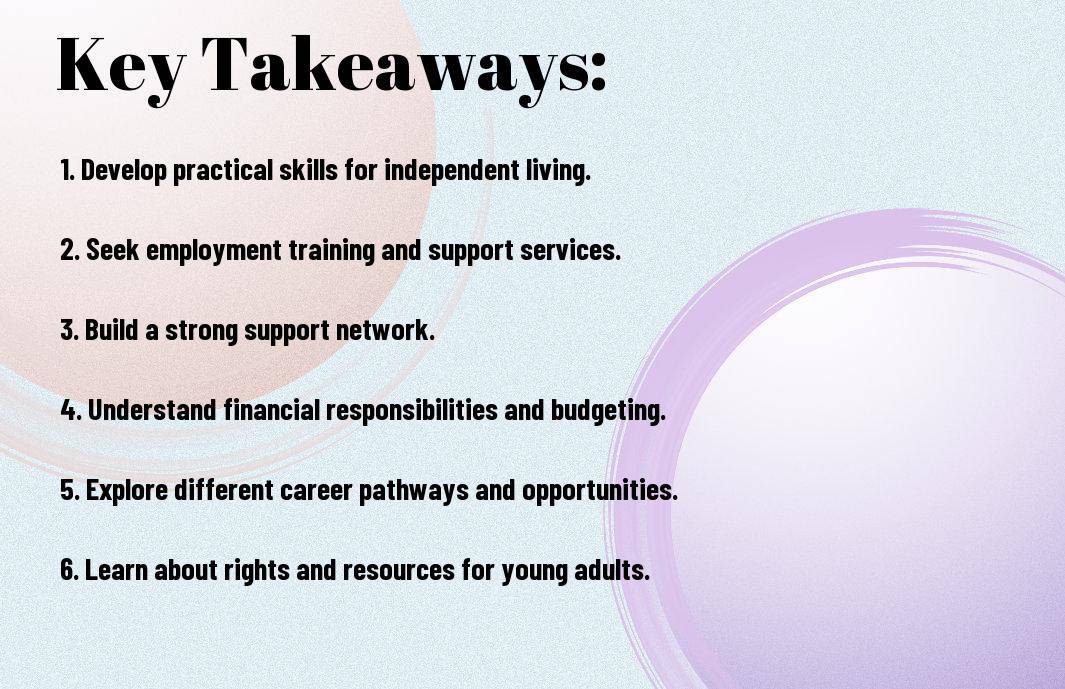Indubitably, the transition to adulthood can be a challenging and pivotal period in a young person’s life. As young individuals prepare to enter the workforce and live independently, there are crucial elements to consider in order to ensure a successful and fulfilling journey. It is paramount to acknowledge the importance of acquiring essential life skills such as budgeting, time management, and household maintenance, as these are fundamental for thriving in the adult world. Additionally, understanding the risks and responsibilities associated with employment, such as workplace rights and health and safety, is vital for a smooth transition. Equally important is nurturing a positive mindset and resilience in the face of challenges, as well as seeking out available support and resources. This blog post aims to provide valuable insights and guidance for young individuals embarking on this crucial phase of their lives.
Key Takeaways:
- Independence: Transitioning to adulthood involves preparing for independence in employment and living arrangements.
- Skills development: Young adults need to focus on developing skills that will be essential for securing employment and living independently.
- Support network: It is crucial for young adults to build a strong support network to assist them as they navigate the challenges of transitioning to adulthood.


Preparing for Employment
As young adults transition into the workforce, it’s crucial to equip them with the necessary skills and knowledge to succeed in their chosen career paths. Preparation for employment involves developing essential job skills and mastering the art of navigating the job market to secure suitable employment.
Developing Essential Job Skills
Developing essential job skills is a vital step in preparing for employment. Young adults should focus on honing their communication, problem-solving, time management, and teamwork skills. It’s important for them to gain practical experience through internships, part-time jobs, or volunteer work to enhance their skill set. Additionally, seeking out mentorship and guidance from professionals in their chosen industry can provide valuable insight and guidance.
Navigating the Job Market and Securing Employment
Navigating the job market can be daunting for young adults. It’s essential for them to research potential employers, understand industry trends, and tailor their applications to stand out. Utilising online job platforms, attending career fairs, and networking with professionals can help in securing suitable employment. Interview preparation and resume writing workshops can also give them a competitive edge in the job market.
Moreover, gaining an understanding of the current labour market demands and employability skills required in their desired field is crucial in securing long-term employment and career progression.
Achieving Independent Living
As you prepare for adulthood, achieving independent living becomes a crucial goal. This means having the skills and knowledge to manage your finances, find suitable housing, and understand the responsibilities of being a tenant.
Financial Literacy and Budgeting
Financial literacy is essential for anyone transitioning to independent living. It involves understanding concepts such as budgeting, saving, managing debt, and making wise financial decisions. Learn to create a budget that covers essential expenses such as rent, utilities, groceries, and transportation. It’s important to develop the discipline to stick to your budget and avoid unnecessary spending.
Finding Housing and Understanding Tenancy
Finding suitable housing is a key aspect of achieving independent living. Research the local property market, consider your budget and preferred location, and explore different housing options such as renting a flat, sharing accommodation, or exploring supported living arrangements. Understanding tenancy involves knowing your rights and responsibilities as a tenant, including paying rent on time, maintaining the property, and adhering to the terms of your tenancy agreement.
When finding housing and understanding tenancy, it’s crucial to consider factors such as location, safety, access to amenities, and transport links. Take the time to inspect potential properties and ask questions about the terms of the tenancy before making a decision. It’s also important to be aware of scams and fraudulent listings when searching for accommodation.
Life Skills for Adult Success
As young people transition into adulthood, it becomes crucial for them to develop a range of life skills that are essential for success in their professional and personal lives. From managing one’s time effectively to maintaining good health and wellness, acquiring these skills is vital for a smooth transition into independent adulthood.
Time Management and Personal Organization
Time management and personal organisation are foundational skills that contribute to an individual’s success in adulthood. The ability to plan and prioritise tasks, as well as manage deadlines and commitments, is crucial for achieving goals and maintaining a healthy work-life balance. In addition, the skill of personal organisation enables individuals to keep track of important documents, schedules and responsibilities, leading to increased productivity and reduced stress levels.
Health and Wellness in Adulthood
Health and wellness play a critical role in an individual’s overall success in adulthood. Maintaining a balanced diet, engaging in regular physical activity, and prioritising mental well-being are essential for sustaining optimal health. The adoption of healthy habits not only reduces the risk of developing chronic diseases but also enhances one’s energy levels, mood, and cognitive function, contributing to a positive overall quality of life.
Developing the skills of time management, personal organisation and prioritising health and wellness are crucial for young adults as they prepare for employment and independent living in adulthood. By embracing these skills, individuals can achieve success in their personal and professional lives, while safeguarding their health and well-being.
Social and Emotional Readiness
As young adults prepare for the transition to employment and independent living, it is important to consider their social and emotional readiness. This includes their ability to navigate social situations, build and maintain relationships, and develop coping strategies for the challenges they may face.
For comprehensive guidance on transition planning, you can refer to the Transition Planning resource.
Building and Maintaining Relationships
Building and maintaining meaningful relationships plays a critical role in the successful transition to adulthood. Young adults should be supported in developing essential social skills, such as effective communication, active listening, and empathy. It is important for them to understand the value of healthy relationships and how to nurture them over time. Encouraging participation in social activities and group settings can also help to broaden their social network and build confidence in social interactions.
Coping Strategies and Resilience
Developing effective coping strategies and resilience is essential for young adults as they navigate the challenges of adulthood. Encouraging them to identify and utilise positive coping mechanisms, such as mindfulness, physical activity, or creative outlets, can help them manage stress and adversity. Building resilience involves promoting a positive mindset and the ability to bounce back from setbacks, equipping them with the strength to overcome obstacles they may encounter.
It is important to encourage the development of coping strategies that promote mental well-being, emotional resilience, and positive coping mechanisms in order to support their transition to adulthood.

Transitioning to Adulthood – Preparing for Employment and Independent Living
In conclusion, the transition to adulthood can be a challenging time for young people, especially when it comes to preparing for employment and independent living. It is essential for young adults to acquire valuable skills, such as time management, communication, and problem-solving, in order to successfully navigate the adult world. Additionally, seeking out opportunities for work experience and further education can greatly benefit individuals in their journey towards independence. By carefully planning and preparing for the future, young adults can confidently embrace the responsibilities that come with adulthood and establish themselves in the workforce and in their own living arrangements. It is important for individuals, families, and communities to provide the support and resources needed for a smooth transition, as a strong foundation in early adulthood can greatly impact an individual’s future success and well-being.
FAQ
Q: What does transitioning to adulthood mean?
A: Transitioning to adulthood refers to the period of time when a young person moves from being a teenager to an adult, taking on more responsibilities and making decisions about their future.
Q: Why is preparing for employment important during the transition to adulthood?
A: Preparing for employment is crucial during the transition to adulthood as it helps young adults gain financial independence, develop valuable skills, and contribute to society.
Q: What are some essential skills needed for independent living?
A: Essential skills for independent living include managing finances, cooking, cleaning, time management, and problem-solving.
Q: How can parents and guardians support their young adults in preparing for employment and independent living?
A: Parents and guardians can support their young adults by providing guidance, helping them develop important skills, and connecting them with resources such as career advice and independent living support services.
Q: What resources are available to help young adults with disabilities in preparing for employment and independent living?
A: There are various support services and organisations dedicated to helping young adults with disabilities in preparing for employment and independent living, such as disability employment agencies and independent living centres.
Q: What role do schools and educational institutions play in preparing young adults for employment and independent living?
A: Schools and educational institutions play a crucial role in providing young adults with vocational training, career guidance, and practical life skills to prepare them for employment and independent living.
Q: How can young adults gain work experience and skills for employment during the transition to adulthood?
A: Young adults can gain work experience and skills through internships, apprenticeships, volunteering, and part-time jobs, which all provide valuable opportunities for learning and personal development.







